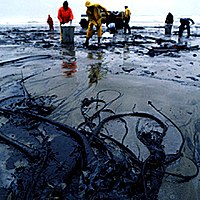
Photo from wikipedia
Oil spill on sea surfaces, which mainly produced by the oil leakage accident happened on tankers, offshore platforms, drilling rigs and wells, has bring irreversible damage to marine environments and… Click to show full abstract
Oil spill on sea surfaces, which mainly produced by the oil leakage accident happened on tankers, offshore platforms, drilling rigs and wells, has bring irreversible damage to marine environments and ecosystems. Among various spill oil handling methods, using sorbents to absorb and recover spill oils is a perspective method because they are cost-effective and enable a high recovery and without secondary pollution to the ecosystem. Currently, sorbents based on biomass materials have aroused extensively attention thanks to their features of inexpensive, abundant, biodegradable, and sustainable. Herein, we comprehensively review the state-of-the-art development of biomass-based sorbents for spill oil cleanup in the recent five years. After briefly introducing the background, the basic theory and material characteristics for the separation of oil from water and the adsorption of oils is also presented. Various modification methods for biomass materials are summarized in section three. Section four discusses the recent progress of biomass as oil sorbents for oil spill cleanup, in which the emphasis is placed on the oil sorption capacity and the separation efficiency. Finally, the challenge and future development directions is outlined.
Journal Title: Nanomaterials
Year Published: 2023
Link to full text (if available)
Share on Social Media: Sign Up to like & get
recommendations!